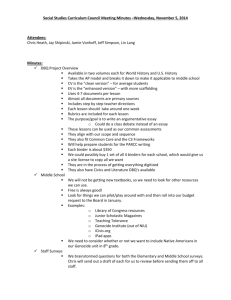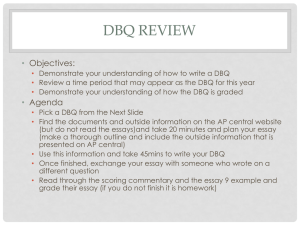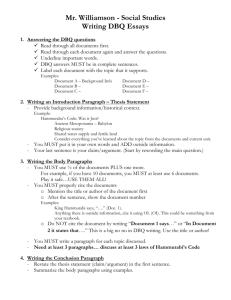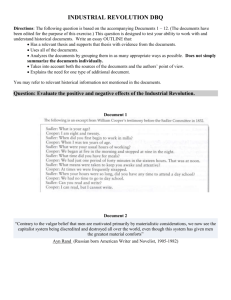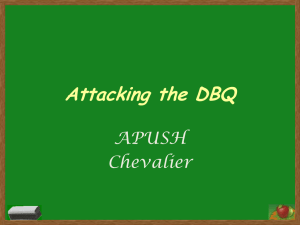AP European History
advertisement
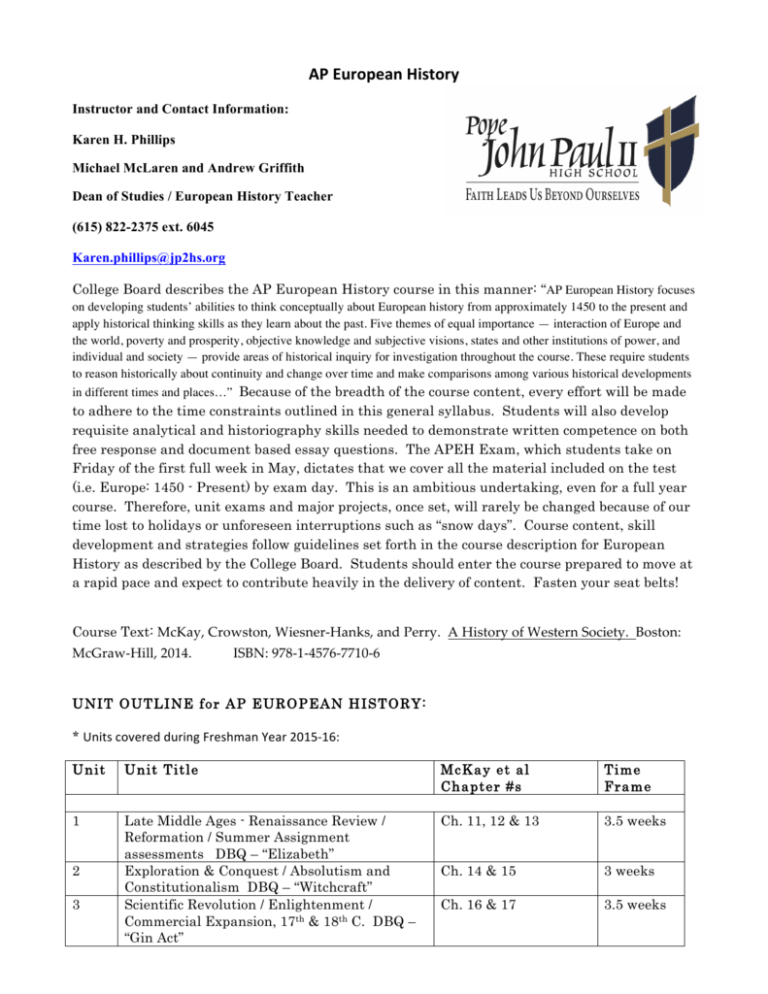
AP European History Instructor and Contact Information: Karen H. Phillips Michael McLaren and Andrew Griffith Dean of Studies / European History Teacher (615) 822-2375 ext. 6045 Karen.phillips@jp2hs.org College Board describes the AP European History course in this manner: “AP European History focuses on developing students’ abilities to think conceptually about European history from approximately 1450 to the present and apply historical thinking skills as they learn about the past. Five themes of equal importance — interaction of Europe and the world, poverty and prosperity, objective knowledge and subjective visions, states and other institutions of power, and individual and society — provide areas of historical inquiry for investigation throughout the course. These require students to reason historically about continuity and change over time and make comparisons among various historical developments in different times and places…” Because of the breadth of the course content, every effort will be made to adhere to the time constraints outlined in this general syllabus. Students will also develop requisite analytical and historiography skills needed to demonstrate written competence on both free response and document based essay questions. The APEH Exam, which students take on Friday of the first full week in May, dictates that we cover all the material included on the test (i.e. Europe: 1450 - Present) by exam day. This is an ambitious undertaking, even for a full year course. Therefore, unit exams and major projects, once set, will rarely be changed because of our time lost to holidays or unforeseen interruptions such as “snow days”. Course content, skill development and strategies follow guidelines set forth in the course description for European History as described by the College Board. Students should enter the course prepared to move at a rapid pace and expect to contribute heavily in the delivery of content. Fasten your seat belts! Course Text: McKay, Crowston, Wiesner-­‐‑Hanks, and Perry. A History of Western Society. Boston: McGraw-­‐‑Hill, 2014. ISBN: 978-­‐‑1-­‐‑4576-­‐‑7710-­‐‑6 U N IT OU TLIN E for AP EU ROPEAN H ISTORY: * Units covered during Freshman Year 2015-­‐16: U nit U nit Title M cKay et al Chapter #s Tim e Fram e 1 Late Middle Ages - Renaissance Review / Reformation / Summer Assignment assessments DBQ – “Elizabeth” Exploration & Conquest / Absolutism and Constitutionalism DBQ – “Witchcraft” Scientific Revolution / Enlightenment / Commercial Expansion, 17th & 18th C. DBQ – “Gin Act” Ch. 11, 12 & 13 3.5 weeks Ch. 14 & 15 3 weeks Ch. 16 & 17 3.5 weeks 2 3 4 5 6 7 8 9 End Qtr. 1 18th C. Economy & 7 Yrs War / French Revolution and Napoleon DBQ – “The Terror” Industrial Revolution / 19th C. Revolution in Politics / Revolts of 1848 DBQ – “Flemings & Walloons” Exam Review & Exams (DBQ) End Qtr. 2 / Semester 1 19th C. Society / Age of Nationalism / DBQ – “1848 Revolutions” Imperialism / WWI & Russian Revolution DBQ – “Sudan Crisis” Age of Anxiety (Interwar period) / WWII End Qtr. 3 Cold War / Decolonization / Fall of Communism / DBQ – “European Union” Exam Review (DBQ) Final & National Exam Week Post Exam debriefing / Prep US History End Qtr. 4 / Semester 2 Ch. 18 & 19 (9 weeks) 3 weeks Ch. 20 & 21 3 weeks Ch. 22 & 23 2 weeks (9 weeks) 3.5 weeks Ch. 24 & 25 3.5 weeks Ch. 26 & 27 3 weeks (9 weeks) 3 ½ weeks Ch. 28, 29 & 30 2 weeks 1 week 1 ½ weeks (9 weeks) Assessment Types and Forms for AP European History Type Homework Description Daily preparation for class that involves reading and taking notes in a particular format Assessment Form Primary Homework Note-­‐taking Formats: • Annotations: notes in the textbook that denote student questions about, connections to other themes or ideas about the reading • Main Idea Logs: Formatted note-­‐taking that denotes the theme of the reading section and provides details / Specific Factual Information (SFI) that supports the theme. Other note-­‐taking formats used occasionally: • Mind Map: a diagram used to represent words, ideas, tasks, or other items linked to and arranged around a central key word or idea • Concept Map: A concept map is a diagram showing the relationships among concepts. They are graphical tools for organizing and representing knowledge • Tabbed or Step Book: a visual organizer where content is divided according to topic and recorded on a particular page of a ‘book’ according to the Approx Weight 10-­‐ 15 points per assignment (@ 25% of the usual unit grade) • • • Simulations or Trials Quizzes DBQs and LEQs Assignment where each student takes a different role to play a character to re-­‐ enact a major historical event Brief formative (or occasionally w/ maps a summative) assessment where students reveal skill or knowledge of limited content Document Based Essays and Long Essay Questions • • • • • • • • Unit Tests Multiple Choice / Short Answer / FRQ • • • Exams Mid-­‐Term Exam Final Exam • topic Time Line: an organizer that assembles historical events in chronological order. Timelines usually require a short paragraph annotation that explains key information about the event. Note Card: a type of outline where student records information on a three-­‐part format: main theme, important factual information, response to information Individual Presentations in Powerpoint, poster or timeline format Research component: a written presentation of information obtained on the assigned topic Performance component: aspects such as vocal expression, volume, assertiveness Visual component: costuming or other visual accompaniments that enhance the presentation Map quiz: On a few occasions during the year students will demonstrate their knowledge regarding geographical features of Europe and political entities by locating them on a map. SAQs: short answer essays where students will write a paragraph response to a multi-­‐question prompt Objective quizzes to determine content knowledge DBQ: Essays that address a particular question by using a group of (8-­‐10) historical documents; graded with the use of a core-­‐scoring rubric identical to the one used to assess the National AP Exam DBQ LEQ: Long free response essay where students generate a well-­‐organized, thesis-­‐driven argument, using evidence from specific factual content to support the argument The ability to use knowledge about the content to answer multiple-­‐choice style objective questions is one of the important skills that must be developed in order to be successful in AP courses and in other test (SAT, ACT)assessments. Occasionally, tests will include other types of short answer questions: fill-­‐in-­‐the-­‐blank or matching. These will constitute a small percentage of the unit grade FRQ: Free Response Question is an essay where a question is posed, targeting information from specific topics or time periods. Students must respond to the ‘terms’ of the question with relevant factual support The Euro History Exams follow the format of the national AP Exam 100 points per simulation (@ 10% of a semester grade) @ 15-­‐25 points for a points depending on type (@10% of quarter grade) 100 points per essay (@ 25% of a unit grade 150-­‐200 points per unit test @ 35% of total grade (Varies according to number of chapters covered in the unit) In its own category, the • • • • A 60 (M-­‐T) or 80 (Final) item Multiple Choice component that counts 50% of the exam score A DBQ counts 22.5% of the exam score Two FRQs count 27.5% of the exam score The exam is scored using the rubric and scoring guidelines employed on the national exam Grading Codes used in Veracross to indicate progress with regard to individual assignments: Description Pending Abbreviation Pending Complete Not Turned In -­‐ NTI Missing Assignment Incomplete M Not Required to Complete NREQ Inc Notes Assignment has not been graded or the deadline has not arrived Completed assignment Student was present but did not turn in the assignment. Late penalties apply. Student was absent. Student can receive full credit for the assignment when returning to school. Student failed to finish or hand in an acceptable quality of work on a major assessment. Student is not required to complete the assignment exams count 20% of the semester grade each term
